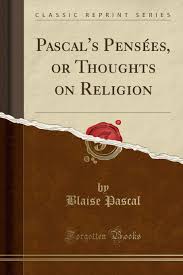Pensées Page #4
The Pensées is a collection of fragments on theology and philosophy written by 17th-century philosopher and mathematician Blaise Pascal. Pascal's religious conversion led him into a life of asceticism, and the Pensées was in many ways his life's work. The Pensées represented Pascal's defense of the Christian religion.
Genre: Religion, Spirituality & New Age
Genre: Religion, Spirituality & New Age
- Year:
- 1670
- 3,270 Views
To understand the method which Pascal employs, the reader must be prepared to follow the process of the mind of the intelligent believer. The Christian thinker--and I mean the man who is trying consciously and conscientiously to explain to himself the sequence which culminated in faith, rather than the public apologist--proceeds by rejection and elimination. He finds the world to be so and so; he finds its character inexplicable by any non-religious theory; among religions he finds Christianity, and Catholic Christianity, to account most satisfactorily for the world and especially for the moral world within; and thus, by what Newman calls "powerful and concurrent" reasons, he finds himself inexorably committed to the dogma of the Incarnation. To the unbeliever, this method seems disingenuous and perverse; for the unbeliever is, as a rule, not so greatly troubled to explain the world to himself, nor so greatly distressed by its disorder; nor is he generally concerned (in modern terms) to "preserve values." He does not consider that if certain emotional states, certain developments of character, and what in the highest sense can be called "saintliness" are inherently and by inspection known to be good, then the satisfactory explanation of the world must be an explanation which will admit the "reality" of these values. Nor does he consider such reasoning admissible; he would, so to speak, trim his values according to his cloth, because to him such values are of no great value. The unbeliever starts from the other end, and as likely as not with the question: Is a case of human parthenogenesis credible? and this he would call going straight to the heart of the matter. Now Pascal's method is, on the whole, the method natural and right for the Christian; and the opposite method is that taken by Voltaire. It is worth while to remember that Voltaire, in his attempt to refute Pascal, has given once and for all the type of such refutation; and that later opponents of Pascal's Apology for the Christian Faith have contributed little beyond psychological irrelevancies. For Voltaire has presented, better than any one since, what is the unbelieving point of view; and in the end we must all choose for ourselves between one point of view and another. I have said above that Pascal's method is "on the whole" that of the typical Christian apologist; and this reservation was directed at Pascal's belief in miracles, which plays a larger part in his construction than it would in that, at least, of the modern liberal Catholic. It would seem fantastic to accept Christianity because we first believe the Gospel miracles to be true, and it would seem impious to accept it primarily because we believe more recent miracles to be true; we accept the miracles, or some miracles, to be true because we believe the Gospel of Jesus Christ: we found our belief in the miracles on the Gospel, not our belief in the Gospel on the miracles. But it must be remembered that Pascal had been deeply impressed by a contemporary miracle, known as the miracle of the Holy Thorn: a thorn reputed to have been preserved from the Crown of Our Lord was pressed upon an ulcer which quickly healed. Sainte-Beuve, who as a medical man felt himself on solid ground, discusses fully the possible explanation of this apparent miracle. It is true that the miracle happened at Port-Royal, and that it arrived opportunely to revive the depressed spirits of the community in its political afflictions; and it is likely that Pascal was the more inclined to believe a miracle which was performed upon his beloved sister. In any case, it probably led him to assign a place to miracles, in his study of faith, which is not quite that which we should give to them ourselves.
Translation
Translate and read this book in other languages:
Select another language:
- - Select -
- 简体中文 (Chinese - Simplified)
- 繁體中文 (Chinese - Traditional)
- Español (Spanish)
- Esperanto (Esperanto)
- 日本語 (Japanese)
- Português (Portuguese)
- Deutsch (German)
- العربية (Arabic)
- Français (French)
- Русский (Russian)
- ಕನ್ನಡ (Kannada)
- 한국어 (Korean)
- עברית (Hebrew)
- Gaeilge (Irish)
- Українська (Ukrainian)
- اردو (Urdu)
- Magyar (Hungarian)
- मानक हिन्दी (Hindi)
- Indonesia (Indonesian)
- Italiano (Italian)
- தமிழ் (Tamil)
- Türkçe (Turkish)
- తెలుగు (Telugu)
- ภาษาไทย (Thai)
- Tiếng Việt (Vietnamese)
- Čeština (Czech)
- Polski (Polish)
- Bahasa Indonesia (Indonesian)
- Românește (Romanian)
- Nederlands (Dutch)
- Ελληνικά (Greek)
- Latinum (Latin)
- Svenska (Swedish)
- Dansk (Danish)
- Suomi (Finnish)
- فارسی (Persian)
- ייִדיש (Yiddish)
- հայերեն (Armenian)
- Norsk (Norwegian)
- English (English)
Citation
Use the citation below to add this book to your bibliography:
Style:MLAChicagoAPA
"Pensées Books." Literature.com. STANDS4 LLC, 2024. Web. 5 May 2024. <https://www.literature.com/book/pens%C3%A9es_114>.




Discuss this Pensées book with the community:
Report Comment
We're doing our best to make sure our content is useful, accurate and safe.
If by any chance you spot an inappropriate comment while navigating through our website please use this form to let us know, and we'll take care of it shortly.
Attachment
You need to be logged in to favorite.
Log In